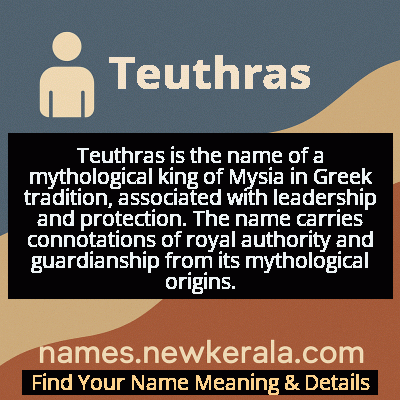Teuthras Name Meaning & Details
Origin, Popularity, Numerology Analysis & Name Meaning of Teuthras
Discover the origin, meaning, and cultural significance of the name TEUTHRAS. Delve into its historical roots and explore the lasting impact it has had on communities and traditions.
Name
Teuthras
Gender
Male
Origin
Greek
Lucky Number
4
Meaning of the Name - Teuthras
Teuthras is the name of a mythological king of Mysia in Greek tradition, associated with leadership and protection. The name carries connotations of royal authority and guardianship from its mythological origins.
Teuthras - Complete Numerology Analysis
Your Numerology Number
Based on Pythagorean Numerology System
Ruling Planet
Uranus (Rahu)
Positive Nature
Strong sense of order, loyal, practical, and disciplined.
Negative Traits
Stubborn, overly serious, rigid, and prone to feeling restricted.
Lucky Colours
Blue, gray.
Lucky Days
Saturday.
Lucky Stones
Blue sapphire.
Harmony Numbers
1, 7, 8.
Best Suited Professions
Managers, engineers, accountants, organizers.
What People Like About You
Dependability, discipline, practicality.
Famous People Named Teuthras
Teuthras of Mysia
Mythological King
Ruled Mysia and adopted Telephus as his heir
Teuthras (Historical Figure)
Ancient Ruler
Mentioned in ancient texts as a regional leader in Asia Minor
Teuthras the Warrior
Mythological Hero
Known for his military prowess and protection of his kingdom
Name Variations & International Equivalents
Click on blue names to explore their detailed meanings. Gray names with will be available soon.
Cultural & Historical Significance
In historical context, the name Teuthras reflects the complex cultural interactions between Greek settlers and indigenous populations in Asia Minor. The mythological kingdom of Mysia was a real geographical region where Greek and Anatolian cultures blended, and figures like Teuthras served as symbolic bridges between these worlds. His portrayal in ancient literature, including possible mentions in lost epics and later mythological compilations, demonstrates how local rulers were incorporated into Panhellenic mythological traditions, serving both political and cultural unification purposes in the ancient Greek world.
Extended Personality Analysis
Individuals named Teuthras are typically perceived as natural leaders with a strong sense of responsibility and protective instincts. They often exhibit the qualities of a guardian or patriarch, showing deep commitment to their family, community, or cause. This stems from the mythological Teuthras's role as an adoptive father and protector of his kingdom. They tend to be decisive, practical, and grounded in their approach to problems, preferring action over deliberation when circumstances demand immediate response.
Teuthras-named individuals often possess a blend of traditional values and adaptive thinking, reflecting the mythological king's ability to navigate complex political and familial situations. They are typically loyal to their commitments but can be pragmatic when necessary, showing the strategic thinking required of rulers. Their leadership style tends to be more paternal than authoritarian, focusing on the well-being of those under their care. However, they may sometimes struggle with balancing personal attachments with broader responsibilities, mirroring the mythological tensions in Teuthras's own story between his adopted heir and biological claims to power.
Modern Usage & Popularity
In contemporary times, Teuthras remains an exceptionally rare name, primarily used in academic circles, by classical enthusiasts, or in Greek families with strong connections to mythological naming traditions. It has never appeared in popular baby name registries and maintains a niche status. The name occasionally surfaces in modern Greek contexts where parents seek distinctive classical names, but its usage is minimal compared to more common mythological names like Achilles or Odysseus. Recent trends show slight increases in obscure mythological names, but Teuthras remains at the far end of this spectrum due to its specific regional associations and complex mythological background.
Symbolic & Spiritual Meanings
Symbolically, Teuthras represents the archetype of the adoptive father and protector king. His story embodies themes of chosen lineage, the transfer of power, and the protection of vulnerable individuals. The name carries connotations of sanctuary and guardianship, reflecting how the mythological Teuthras provided refuge and royal status to Telephus. It also symbolizes the intersection of different cultural traditions, as Mysia stood at the crossroads of Greek and Anatolian civilizations. The name suggests a bridge between worlds – between biological and chosen family, between different cultural identities, and between mortal and heroic realms in mythological context.

